|

The Antill Branch
UPDATED 5 May 2016 |
Edward Antill, vintner Lt. Col. Edward Antill
|
| ||||||||||||||||||||||||||
|
When one considers that many early English names were taken to designate a locality, profession, or personal characteristic, one does wonder at the origin of the name "Antill." The earliest form of the name is the Norse/Germantic name, "Anquetil," and these Gothic invaders did once swarm over the British countryside in as unstoppable a form as their insect namesakes, so perhaps an ant hill on the Antill crest would not be such a bad idea.
| ||||||||||||||||||||||||||
|
Merchant, Lawyer, Friend of Pirate Giles Shelly | ||||||||||||||||||||||||||
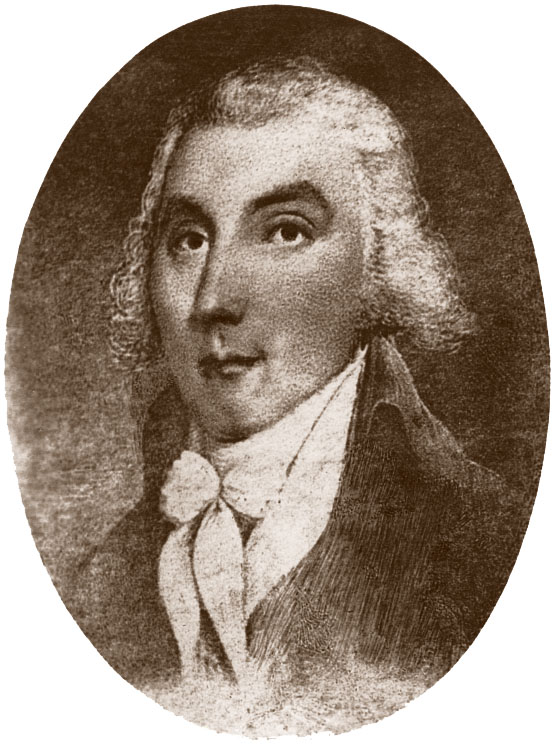 
Extracts from American Newspapers, Relating to New Jersey. 1704-1775 Abraham Van Doren Honeyman, 1894.In 1710, the pirate Giles Shelly made a will in which he states that, being childless, he had adopted the young Edward and raised him. Nothing is known of Sarah or any of Edward Antill's other children. Edward Antill's 1704 will wasn't proved until 1725, which probably had to do with the younger Edward Antill's majority, rather than the continued existence of the father. Abstracts of Wills Vol Liber 10
 A contemporary of [Captain] Kidd was Giles Shelly, master of the ship Nassau, who sailed for Madagascar in June, 1698. Stephen de Lancey and other prominent merchants of New York and London were interested in the venture. Lord Bellomont was at odds with some of the owners, and did not hesitate to class Shelly as a pirate, though with slim foundation, judging by his own statements. "I am told," he writes, July 22, 1699, "this Shelly sold rum which cost but 2s per gallon at New York, for 50 shillings and £3 pr gallon at Madagasca, and a pipe of Madera Wine which cost him £19 he sold there for £300." He returned in May, 1699. and touching at Cape May landed "fourteen men who had been upon piratical voyages in the Kast Indies, and put some others on board a New York sloop . . . . to be landed and dispersed in other places as they found oppertunity." Forty or fifty others he landed in Pennsylvania. It was suspected - nay, believed, at least by Lord Bellomont, and by Governor Basse, of New Jersey - that many, if not most of the men thus surreptitiously landed, had served under Captain Kidd, and that they paid Shelly "12,000 pieces of Eight, and 3000 Lion dollars, nominally as passage money for twenty-nine men to America." Having landed and secured all his goods and money he ran his ship ashore near New York, and then came to the city, where he "so flushed them with Arabian Gold and East India goods that they set the government at defiance." The Governor ordered Shelly to be committed without bail, for piracy. The Council was advised in the morning by Attorney General Graham that this could be lawfully done. In the afternoon, however, he took a contrary stand, and Shelly was admitted to bail, the bond being drawn by Edward Antill, his counsel, and in such a way as to outwit the Attorney General. Lord Bellomont did not hesitate to declare: "There's a violent presumption that Mr Graham was brib'd by Shelly and so contrived his escape." It was reported that the New York merchants had cleared £30,000 by Shelly's voyage from Madagascar. Despite Lord Bellomont's hostility, the successful captain was in later years counted among the most reputable merchants in New York.[ N.Y. Col. Docs., IV., 128, 138, 179-180, 532, 542, 551, 552, 584, 812, 1135; Cal. N.Y. Hist. MSS., II., 271.]
| ||||||||||||||||||||||||||
|
Adopted Son of Pirate Giles Shelly Award Winning Vintner, Son-in-law of Governor Lewis Morris | ||||||||||||||||||||||||||
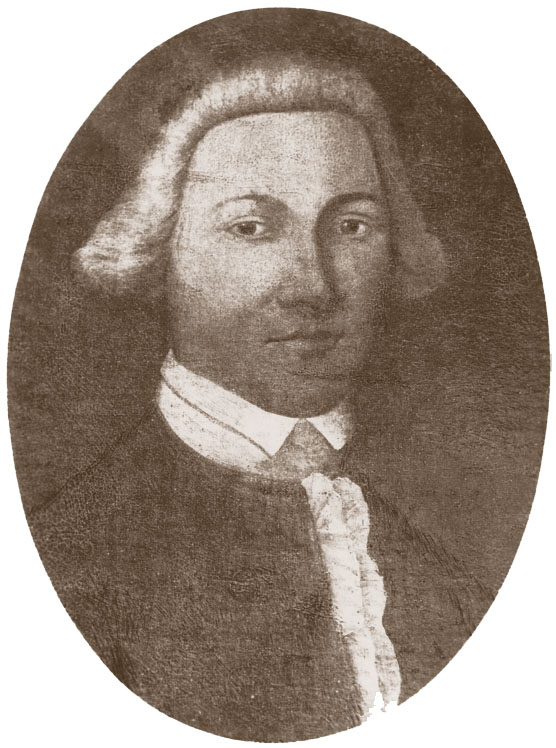 
 He married Catharine -, as appears from a power of attorney given by Edward Antill, of Piscataway, merchant, appointing Catharine his wife attorney to enter into his lands, etc., the four houses within the city of New York only excepted, and to convey the same. This instrument is dated June 20, 1729. His first wife having died, he married 2d, Anne Morris, daughter of Governor Lewis Morris, of New Jersey, June 10, 1739; she was born April 3, 1706. She survived him. Mrs. Antill seems to have possessed something of the Governor's whimsical obstinacy and petulance. Mr. Whitehead says Antill was "an oddity," and as an instance thereof relates an incident to the effect that he once expressed to his wife his regret that the women of the day spent so much time in idleness or profitless pursuits, instead of "abiding in the fields with their maidens," gathering flax or grain. The next morning on coming down to breakfast Mr. Antill found the house deserted, and no signs of the matutinal repast. His wife had taken him at his word, and was out in the fields with her handmaidens, pulling flax. This is an illustration of the serious view Mr. Antill took of life. He was elected to the Provincial Assembly in 1738, serving two years, and quite naturally voted in that body to sustain Gov. Morris, his father-in-law, who on the recommendation of the Council, appointed him, December 1, 1739, to be one of the Judges of the Middlesex County Court of Common Pleas. He was destined for still higher honors. Gov. Morris recommended him in 1740 for a seat in the Council, saying: "He is a man of good Estate & Sence, and if admitted to that board, I hope and believe will prove an usefull and deserving member of it." He wss appointed May 25, 1741, to make a quorum of the Council, but appears to have been so indifferent to the honor that he did not take his seat until October 28, 1743. The appointment was confirmed in 1745. He was reappointed in 1746, as a member of Gov. Jonathan Belcher's Council, and again in 1761, in the Council of Gov. Josiah Hardy, but was suspended by Gov. Thomas Boone a few weeks later, for non-attendance, by which suspension was confirmed by the King in Council, by order dated January 2, 1762. As a member of the Peace of Monmouth county, Dec. 17, 1744; of Bergen county, Sept. 26, 1745, and March 28, 1749; of Middlesex county, Aug. 16, 1746, and March 28, 1749; of Salem county, March 30, 1749; of Morris county, May 13, 1749; of Cumberland county, April 25, 1750; and Judge of the Middlesex county Oyer and Terminer, Aug 30, 1746. He was not only a merchant, but farmed on an extensive scale, having 370 acres and upwards, 40 being in meadow and timber, and an orchard of 500 apple trees. He grew apples for his distiller, and raised trees for the market, offering the latter for sale in 1750 at "nine Pence per Tree, if chosen; or six Pence per Tree if taken by the Row, as they stand in the nursery." His brewhouse, across the river from New Brunswick, was destroyed in a severe storm, in July, 1752, but was at once rebuilt, 60 feet long and 38 feet wide, with a new copper, holding twenty-two barrels, with approved appurtenances for making cider, etc. He offered the whole place for sale in December, 1752, and again in September, 1753. He advertised in the New York Mercury, March, 1, 1762, for sale "at his Seat near New Brunswick, in New-Jersey, four or five Yoke of working Cattle, of different Ages, from 8 to three Years old; they are now fit for Service, being in good Heart, and full Flesh'd, they are fed upon good Hay and Corn."
Dated September 22, 1702. Witnesses, Benjamin Ashe, William Bickly, John Davis. I leave to my executors £150 for their care and trouble. Codicil. Whereas I, Giles Shelley, being very sick and apprehensive the hour of my death is drawing near, I confirm my will, except as regards Mary Peters, who since the making of my will is dead, and that part I annul and make void. I leave to my wife £15 per annum for life. I leave to Elizabeth Clarke £20 in addition to her legacy. I leave to. Mr. Chambers £50. To the widow Sheppard £50. To Anne, daughter of Edward Antill, £150. I also give to my wife £60 in money or household goods. Dated February 19, 1710. Witnesses, Lancaster Symes, Stephen Thomas, Gilbert Ash, William Bickley. Proved, March 6, 17ff. [note. - Captain Giles Shelley was one of the citizens of New York, who by privateering, or what might be more properly called piracy, amassed a fortune by his very successful voyages. The lot and house where he lived on Pearl street, was in after years taken to extend Cedar street to Pearl. - W. S. P.]
| ||||||||||||||||||||||||||
|
Battle of Yorktown, Friend of Alexander Hamilton 1st Cousin of Declaration Signer Lewis Morris | ||||||||||||||||||||||||||

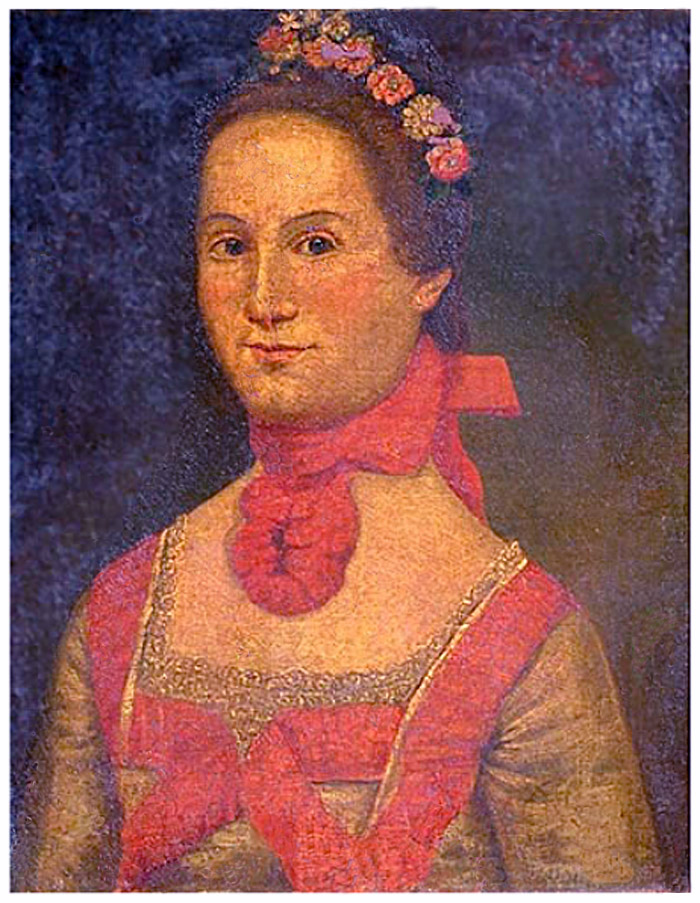 Charlotte Riverin Antill (1750-1785)
Timothy and Rhoda Ogden Edwards Colonel Edward Antill, of New York and Charlotte Riverain, of Montreal. Lt. Colonel Antill was with General Montgomery, as his Chief Engineer, in the attack on Quebec, 1775; appointed by General Benedict Arnold Adjutant General of the American Army in Canada, 1776; was the intimate friend of General Alexander Hamilton, who became godfather, and, later, guardian to his infant daughter, Frances, afterwards the wife of Arthur Tappan.
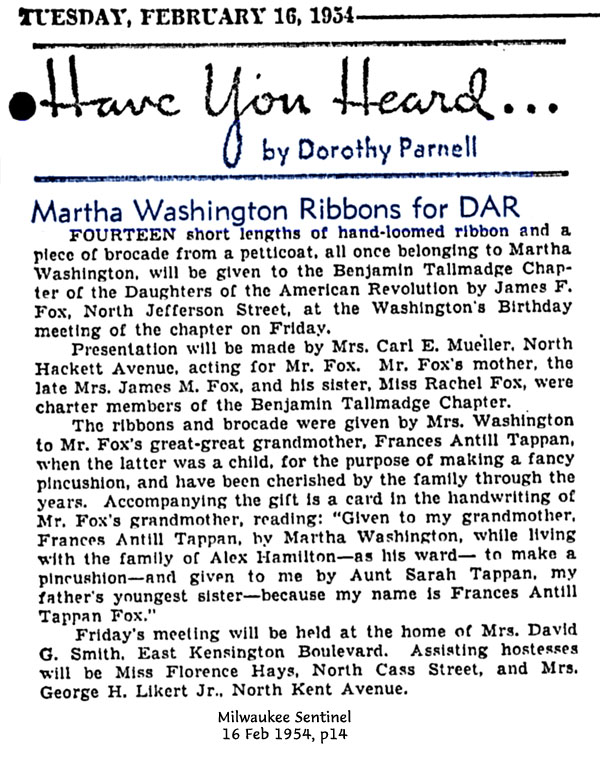
Edward Antill and his family were living in Quebec when General Montgomery's forces surrounded the city in December of 1775. Edward had married Charlotte Riverin, the daughter of a merchant, in May of 1767, when she was 15 years old and he was 25. By December of 1775, Charlotte had already had 6 children, 3 of whom had died as infants. Antill was ordered to defend the city but, being an American, he refused and joined Montgomery's forces, being taken on as an engineer. He was then 33 years old.
"Mother remembered Gen. Washington once sitting on a sofa in the room where the children were playing, and laying aside his newspaper, to watch them, and smile and encourage them to continue their frolic. Once, on a reception evening, when the drawing-room in his house was filled with ladies and gentlemen, talking and laughing, and the children were amusing themselves in a corner, there was a sudden great stillness—and mother looked up with surprise and awe, and saw Gen. Washington coming through the folding doors. "From the time mother was twelve years old, until she was married, she resided with her sister, Mrs. Lansing, who, with her husband, filled well the place of the tenderest father and mother to her. They had four children, who were near her own age. "Father liked to tell us of his first meeting mother in church. They sat opposite each other in a square pew. He said he was attracted by her bright black eyes, and cheerful and animated expression. She was naturally bright and cheerful, generous and unselfish. It was her constant aim to make a happy home for her husband and children—a home where friends were ever welcome, and the poor and sorrowful found help and comfort. When father was absent, and there was not any guest to officiate, mother always led in prayer at family worship."
He graduated at King's College, New York, in the CLass of 1762. Was a member of a prominent family of New Jersey. In 1766 he settled in Quebec as a lawyer, where he married Charlotte Riverin. When General Montgomery appeared before Quebec in December, 1775, he left that city, and joining him, influenced him to change his plan of attack. He became his Chief-Engineer, constructing field works of ice, where earth was inaccessible, and was present with him when he fell. When leaving the camp at Lachine on the 5th of January, five days afterwards, he wrote to Colonel Burr.
Sixteen companies, however, appear to have been the fullest complement of what was known as "Congress' Own," It had evacuated Canada, under General Sullivan, and therefore continued in his Brigade, which served with the main army at Trenton and Princeton, and later, in protecting the lines at Morristown. On the 8th of January, 1777, General Washington wrote him from his headquarters there a letter suggestive of coming action: "Call upon all your officere who are upon recruiting service to exert themselves as much as possible in filling their companies and sending their recruits forward to some general place of rendezvous, that they may be armed, equipped and got into service, with as much expedition as possible. As you and Colonel Hazien had the nomination of your own officers by virtue of your commissions, I shall have no objection to any gentleman of good charscter whom you may think fit to appoint," On the 24th of February following, Richard Peters, Secretary of War, urges, in a letter, upon Colonel Antill, then commanding the regiment, the necessity, from impending events, of promptness in hurrying his companies forward to unite in meeting the enemy. In complying, the regiment was soon actively engaged under Sullivan, and when he attacked the rear of Howe's army on Staten Island - consisting of three thousand British and loyalists - with eight hundred men, on the 22d of June, after partial success succumbed to the vigorous resistance, he became a prisoner, thereby losing his opportunity of being present at Brandywine, Germantown, and in much important service with his regiment. He was not exchanged until November 10th, 1780, and only then through the influence of his brother. Major John Antill, who, differing in sentiment, adhered to the Crown, Rejoining his regiment at Flshkill, he soon afterwards assisted in beating up the quarters of Colonel James de Lancey at Morrisania, for which he earned the thanks of Washington, in general orders. In August he marched to Philadelphia, joining Colonel Olney's Rhode Islanders, and proceeding by the Chesapeake and James River to Yorktown and the surrender of Cornwallis. Although he had asked Congress to be relieved from service in an earlier period of inactivity, he continued therein until the disbanding of his regiment in November, 1783. Not found on the Half-Pay Roll, he appears on the Balloting Book of New York in the list of Canadian and Nova Scotia refugees, who had united with the Americans, to whom lands were granted by the State under the direction of its commissioners. The following letter, preserved among the Society's archives, is of interest:
His wife resided in New York during the war, died there on the 3d of September, 1785, and was buried in St. Paul's Churchyard. Colonel Antill returned to his old home at St. Johns, and also died soon after. His eldest daughter, Mannette, married Colonel Garrit G. Lansing, of Albany, and his youngest, Frances, became the wife of Arthur Tappan, Esq. It will be seen by "Whiting's Revolutionary Orders of Washington" that his useful life was not free from one of those Courts of Inquiry that attend such men as venture upon authority, and that after an impartial investigation he was honorably acquitted. He subscribed his name to the Institution of the Cincinnati with the officers of his regiment on the Parchment Roll, with Washington at its head, now in the possession of the General Society.
To George Washington from Edward Antill, 27 March 1780
 Institution of the Society of the Cincinnati, John Schuyler, 1886, p241
| ||||||||||||||||||||||||||





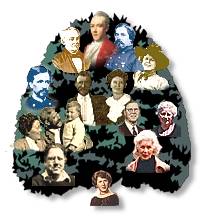










 Copyright © 1997, Mary S. Van Deusen
Copyright © 1997, Mary S. Van Deusen